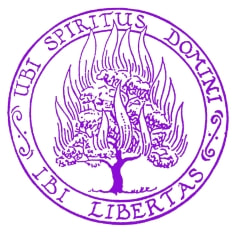
During the children’s address he got one of the children to break a pencil and then asked her to try with a few pencils together which became impossible to break. Rev. Gilpin reminded the children that when we are alone we can break very easily, but when we are part of a loving and supportive community like a church we are not so easily broken.
During the main sermon, Rev. Gilpin addressed the question: “What does a Non-Subscribing Presbyterian believe”?
He said that it is a question that is often asked, especially by visitors who come to the Comber Non-Subscribing Presbyterian Church to visit the grave of Thomas Andrews, himself a Non-Subscribing Presbyterian and the British businessman and shipbuilder who was the naval architect in charge of the plans for RMS Titanic and who died heroically in the Titanic’s maiden voyage and he did his best to save as many woman, children and men as he could, encouraging them to get into life-boats and put on life-jackets.
Rev. Gilpin reminded the congregation that the origin of the Non-Subscribing Presbyterians in Ireland came when certain Presbyterian ministers refused to adhere or ‘subscribe’ to the Calvinist Westminster Confession of Faith because they disagreed with some of the beliefs represented in it, but also because on principle they believed that no Christian should be forced to ‘subscribe’ to what amounted to a ‘man’-made creed as a test of faith to determine whether one is a Christian or not.
A testament to this courageous stand taken by many Presbyterian Ministers and their congregations against the imposition of the Westminster Confession of faith is enshrined in the NSPCI Constitution when it gives freedom of conscience in matters of faith and doctrine with the following words:
I. The Scriptures of the Old and New Testament are the Rule of Christian Faith and Duty under the teaching of our Lord Jesus Christ.
II. That it is the inalienable right of every Christian to search these records of Divine Truth for his [or her] own instruction and guidance, to form his [of her] own opinions with regard to what they teach, and to worship God in sincerity, agreeably to the dictates of his own conscience, without privation, penalty, or inconvenience inflicted by his [or her] fellow-men [or women].
III. That the imposition of Human Tests and Confessions of Faith, and the vain efforts of men [or woman] to produce an unattainable uniformity of belief, have tended to restrict the sacred right of private judgement, and to prevent that free inquiry and discussion which are essential to the extension of religious knowledge.
A Non-Subscribing Presbyterian is therefore a person who affirms the democratic Presbyterian system of church governance, but who does not subscribe or adhere to the Westminster Confession of Faith (or any other human-made creedal statement), but instead seeks to be a follower of Jesus, to his or her best understanding of what that means, from reading and reflecting on the records of the Old and New Testament as his or her conscience dictates.
 RSS Feed
RSS Feed